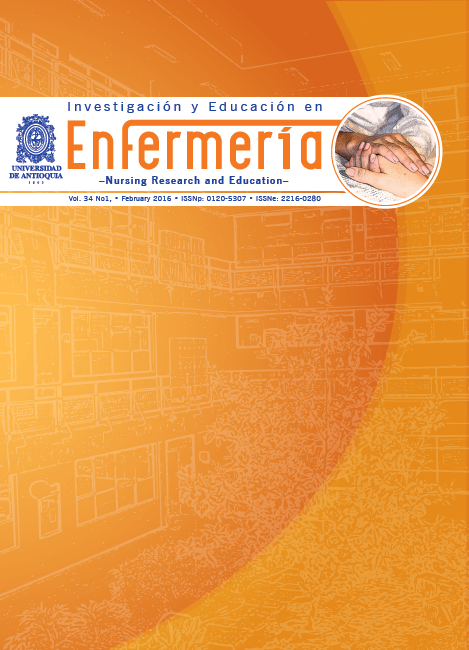Strategies for neonatal developmental care and family-centered neonatal care
DOI:
https://doi.org/10.17533/udea.iee.25994Keywords:
Intensive care neonatal, child development, family.Abstract
Objective. To evaluate neonatal developmental care and family-centered care in a neonatal unit.
Methods. Participatory action research with a purposive sample of health personnel and parents of hospitalized newborn in a Neonatal Unit in Valle del Cauca, Colombia. Five focal groups were conducted with seven mothers and 40 professionals of the unit team, and additionally, 24 non-participant observations were conducted about neonatal developmental care and family-centered care. Three strategies for promotion were implemented for both approaches and subsequently, results were evaluated in terms of practices that take place during neonatal care, after the intervention. A quantitative analysis with descriptive statistics and a qualitative content analysis were done to process the data. Three strategies were implemented: continuing education for professionals, allocation of materials for the positioning of the babies and an informative video for the parents about how the unit operates.
Results. The focus groups and the initial observation showed the necessity to enhance knowledge and practices of the personnel regarding neonatal developmental care and family-centered care.
Conclusion. The promotion of neonatal developmental care and family-centered care generated positive changes in care practices of the professionals in the neonatal unit, through the use of education strategies, communication and the provision of positioning materials.
How to reference this article: Hernández NL, Rubio-Grillo MH, Lovera A. strategies for neonatal developmental care and family-centered neonatal care. Invest Educ Enferm. 2016; 34(1): 104-112
Downloads
References
(1) Als H, Duffy FH, McAnulty GB, Rivkin MJ, Vajapeyam S, Mulkern RV, et al. Early experience alters brain function and structure. Pediatrics. 2004; 113: 846-57.
(2) Smith CG et al. Neonatal Intensive Care stress is associated with brain development in preterm infants. Ann Neurol. 2011; 70(4): 541-549.
(3) Westrup B.Newborn Individualized Developmental Care and Assessment Program (NIDCAP) — Family-centered developmentally supportive care. Early Hum Dev. 2007; 83(7):443–9.
(4) Monti, E, Tingen, M. Multiple paradigms of nursing Science. Adv NursSci.1999; 21(4): 64-80.
(5) Als H. A synactive model of neonatal behavior organization: framework for the assessment of neurobehavioral development in the premature infant and for support of infants and parents in the neonatal environment. Phys Occup Ther Pediatr. 1986; 6 (3-4): 3-53
(6) Gooding JS, Cooper L, Blaine A, Franck L, Howse J, Berns S. Family Support and Family-Centered Care in the Neonatal Intensive Care Unit: Origins, Advances, Impact. Seminars in Perinatology, 2011; 35 (1):20-8.
(7) Ministerio de Salud y Protección Social. Decreto 903 de 2014. Colombia.
(8) Kemmis, S, McTaggart R. The action research planner. 3rd Ed. Victoria: Deakin University; 1988
(9) Bruns DA, Klein S. An Evaluation of Family Centered Care in a Level III NICU. Infants and Young Children. 2005. 18 (3): 222-233
(10) Alegre G. Conocimientos, prácticas y actitud del personal de enfermería acerca de los cuidados del neurodesarrollo del recién nacido prematuro. Rev Nac. 2011; 3(2):23-9.
(11) Raffray M, Semenic S, Osorio Galeano S, Ochoa SC. Barriers and facilitators to preparing families with premature infants for discharge home from the neonatal unit. Perceptions of health care providers. Invest Educ Enferm. 2014; 32(3): 379-392.
(12) Trajkovski S, Schmied V, Vickers M, Jackson D. Neonatal nurses’ perspectives of family-centred care: a qualitative study. J Clin Nurs. 2012; 21 (17): 2477-487.
(13) Montes MT, Quiroga A, Rodríguez S, Sola A. Acceso de las familias a las unidades de internación de Neonatología en Iberoamérica: una realidad a mejorar. An Pediatr (Barc). 2015; [cited 7 Nov 2015]. Available from: http://dx.doi.org/10.1016/j.anpedi.2015.07.030
(14) Armstrong BK, Ball AL, Leatherbarrow J. Constructing a programme of change to improve the provision of family-centred developmental care on a neonatal unit. Infant. 2012; 8 (3):86-90.
(15) Del Morral T. Bancalari E. Evolución de la Actitud frente al Recién Nacido Prematuro. Bol Pediatr. 2010; 50 (supl. 1): 39-42.
(16) Mosqueda R, Castilla Y, Perapoch J, Lorac D, López-Maestro M, Pallása C. Necessary resources and barriers perceived by professionals in the implementation of the NIDCAP. Early Hum Dev. 2013; 89(9):649–53.
Downloads
Published
How to Cite
Issue
Section
License
Derechos de propiedad / Direitos de Propriedade
English: If the article is accepted for publication, all copyright will be of exclusive property of Investigación y Educación en Enfermería. The text and the graphics included in the publication are exclusive responsibility of the authors and not necessarily reflect the thought of the Editorial Committee.
Español: Si el artículo es aprobado para publicación, todos los derechos son de propiedad de Investigación y Educación en Enfermería. El texto y las gráficas incluidas en la publicación son de exclusiva responsabilidad de los autores y no necesariamente refleja el pensamiento del Comité Editorial.
Português: Se o artigo for aceito para publicação, todos os direitos autorais serão de propriedade exclusiva de Investigación y Educación en Enfermería. O texto e os gráficos incluídos na publicação são de responsabilidade exclusiva dos autores e não refletem necessariamente o pensamento do Comitê Editorial.















